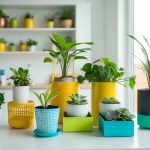Money-Saving Gardening Tips: Efficient Strategies for Growing Vegetables and Herbs
How to Save Seeds for Next Season
Saving seeds from this season’s best-yielding plants is a practice that benefits gardens year after year. To save seeds efficiently, select the healthiest plants and allow their fruit to mature fully before harvesting. Clean and dry seeds thoroughly to prevent mold and rot.
Proper storage is crucial. Keep seeds in a cool, dry place, preferably in airtight containers. Label each container with the plant type and date of collection. Participating in a seed swap can also augment your seed library with diverse varieties from other gardeners.
When to Consider Buying Plants
Buying plants, especially seedlings, is ideal when starting seeds indoors isn’t feasible. This option is beneficial for those who lack the time or space to start seeds, offering a quicker path to a productive garden.
Purchasing plants is also advantageous for beginners who might struggle with germination rates or for those who need disease-resistant varieties available only as plants. These ready-to-plant options provide immediate gratification and can fill gaps where seed-started plants may have failed.
Creating a Cost-Effective Garden Layout
A cost-effective garden layout maximizes space and resources using raised beds, containers, and perennial crops. This approach helps reduce unnecessary expenses while ensuring efficient use of available area.
Maximizing Space with Raised Beds
Raised beds are an excellent way to optimize a garden on a budget. They help control soil quality and improve drainage. Constructing raised beds from recycled materials like old wooden pallets or bricks can further cut costs. This method enables better spacing and organization, allowing for dense planting. It also reduces weed growth, which minimizes maintenance costs. Raised beds can be tailored to any size, making them ideal for both large and small garden spaces.
Using Containers and Pots Effectively
Containers and pots offer a flexible and cost-effective alternative to traditional in-ground planting. They are perfect for small spaces such as balconies or patios. Using repurposed items like buckets, tubs, or old pots can significantly reduce expenses. Containers allow for better control over soil conditions and watering, which is beneficial for high-yield crops. They also provide mobility, enabling gardeners to move plants to optimal sun or shade areas. This flexibility makes them ideal for urban gardening or limited spaces.
Incorporating Perennial Crops
Perennial crops are a smart addition to any cost-effective garden layout. These crops return year after year, eliminating the need for annual replanting and reducing long-term costs. Examples include asparagus, rhubarb, and certain herbs like rosemary and thyme. Perennials often require less water and fertilizer once established, saving additional resources. They provide a reliable harvest, contributing to a consistent supply of fresh produce. Adding perennials ensures that some parts of the garden remain productive with minimal effort and investment.



